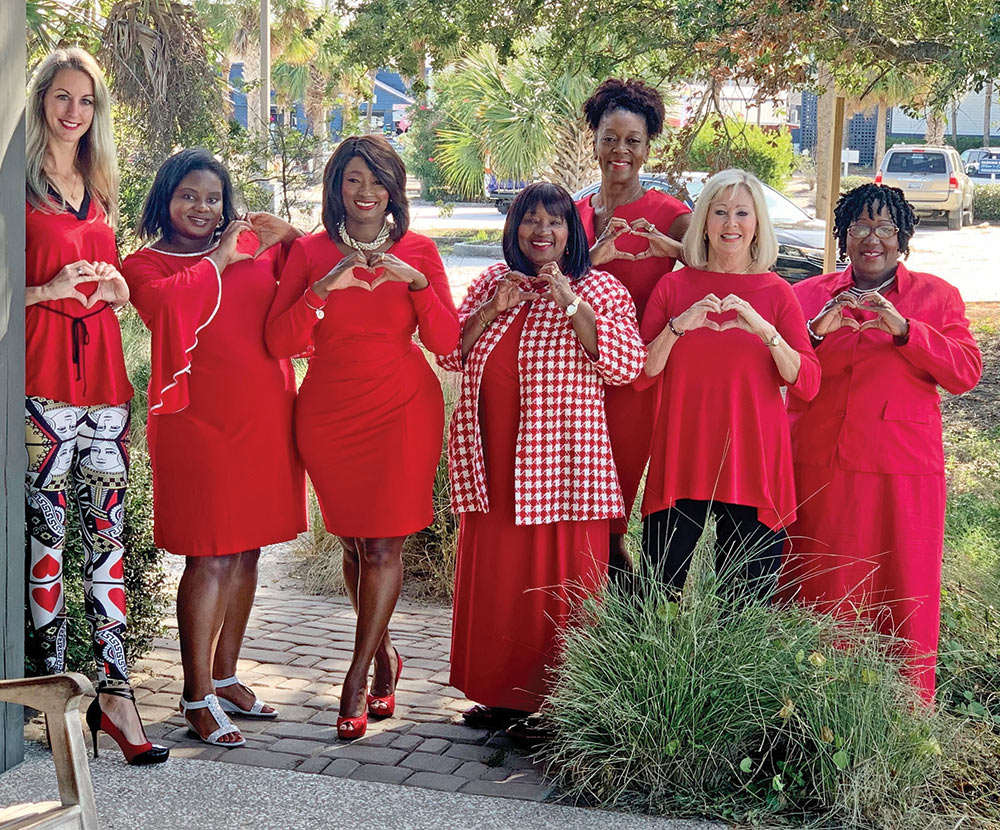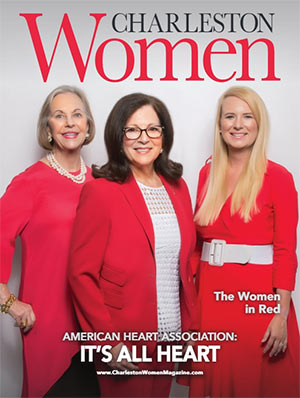
Broadly speaking, the American Heart Association’s Go Red for Women campaign is about empowering women to commit to their own heart health and monitor the heart health of loved ones. Yet, it encompasses much more than that.
“As the American Heart Association’s signature women’s initiative, Go Red For Women increases women’s heart health awareness and serves as a catalyst for change to improve women’s lives globally,” said AHA Charleston executive director Katie Schumacher.
“For almost a decade, we have worked with local survivors, first responders and caregivers, who have committed to our cause and acted as our ambassadors,” said Schumacher. “These ambassadors share their stories with the community to help us make a difference in being a relentless force for a world of longer, healthier lives.”
Having ambassadors create awareness is key because heart disease impacts everyone, especially women, noted Schumacher. Cardiovascular disease is the number-one killer of women, affecting one woman every 80 seconds — but nearly 80% is preventable.
“That’s why it’s so important for women in our community to know their numbers and talk to their doctor,” advised Schumacher. “Know your total cholesterol, blood pressure and blood sugar; know your family history; make smart eating choices; and walk 30 minutes a day.”
Stroke survivor and local ambassador Judy Tarleton said that Go Red fosters awareness and disseminates information about making healthy lifestyle choices, including exercise, diet and regular doctor visits.
“The information Go Red for Women offers is helping to make everyone more aware that both women and men have heart issues, and the symptoms can be very different,” remarked Tarleton, founding partner and broker-in-charge of Carriage Properties.
Men and women can exhibit some similar heart attack symptoms: chest pain, shortness of breath, jaw, neck or back pain and nausea/vomiting. Women, however, may display less obvious signs, including fainting, indigestion, extreme fatigue and pain or pressure in the lower chest or upper abdomen.
“If you show any of these signs, call 911, and get to a hospital immediately,” urged Schumacher.
Go Red for Women Chair Anita Zucker discussed the campaign’s significance to her. “Go Red for Women means to me that we, as women, advocate for our health—for our heart health—and make certain that we understand we have a role to play in this and how important it is to understand the signs of a cardiac arrest or a stroke, so that we can be healthy. Being part of this movement is so critically important to me because it has allowed me to be educated and maintain my own health and pay close attention to it,” said Zucker, who is also CEO of The InterTech Group.
Stroke is the leading cause of disability in the country. AHA recommends learning the acronym FAST to remember stroke warning signs. FAST stands for Face drooping, Arm weakness, Speech difficulty and Time to call 911.
“Time is the most important factor, so you can receive prompt medical treatment,” remarked Schumacher.
Tarleton knows this all too well. She recalled the day she suffered her stroke as a typical busy day — office meetings, showing properties and an exercise class. Tarleton was in her office and felt tired, so she decided to head home to rest.
“My daughter came in, and I tried to tell her that I was going home, but when I tried to speak my words were garbled,” recalled Tarleton. “She immediately asked, ‘What is wrong with you?’ When I tried to speak again, my words were still garbled.”
Her daughter accompanied her to the car and drove home. Tarleton then called her friend Dr. Ken Hanger, a cardiologist, and told him she thought she was having a stroke. “He said, ‘get to MUSC immediately,’ and I did,” she said. “My advice to anyone who thinks they might be having a stroke is to head to the emergency room immediately, and let the medical experts determine what is happening.”
The AHA was part of a group that established “stroke systems of care” in 2018, a collaboration between health systems aiming to provide better treatment for stroke patients statewide.
“Several entities work together to ensure the best possible care in an urgent, time-sensitive manner,” said Schumacher.
Community support is instrumental to AHA’s success, helping them conduct lifesaving work locally. The AHA is funding millions of dollars in research in Charleston, through year-round fundraising campaigns such as Go Red, including more than $23 million at MUSC Health over the past 30 years.
“I see how critically important the American Heart Association is in our community,” said Zucker. “I’m really happy to support the American Heart Association because they continue to progress in a very positive manner to change peoples’ lives and help reduce the number of cardiac events that occur in this country.”
For more information on the Go Red campaign, visit heart.org/lowcountry.
By Colin McCandless
